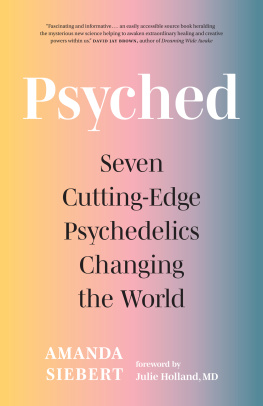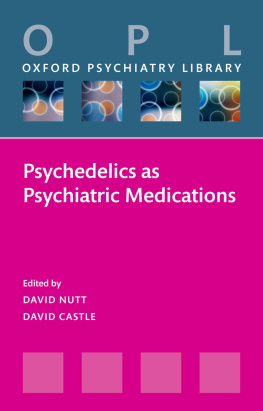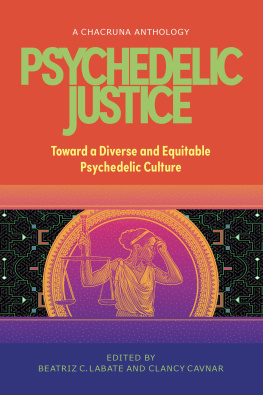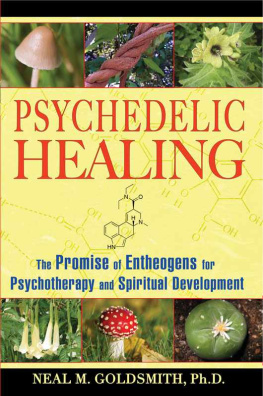All rights reserved. No part of this book may be reproduced, stored in a retrieval system or transmitted, in any form or by any means, without the prior written consent of the publisher or a license from The Canadian Copyright Licensing Agency (Access Copyright). For a copyright license, visit accesscopyright.ca or call toll free to 1-800-893-5777.
Greystone Books Ltd.
greystonebooks.com
Greystone Books thanks the Canada Council for the Arts, the British Columbia Arts Council, the Province of British Columbia through the Book Publishing Tax Credit, and the Government of Canada for supporting our publishing activities.
Let this book be an expression of my gratitude to every steward, keeper, and teacher; to every plant, entheogen, and derivative; to Mother Earth for giving us exactly what we need; and to every reader with a willingness to examine that which exists beyond the mind.
May all of this be for the highest good.
Disclaimer

THIS BOOK IS not intended to be a substitute for medical advice from physicians. The reader should regularly consult a physician about matters relating to their health, and particularly with respect to any symptoms that may require diagnosis or medical attention. While this book may mention specific psychedelic drugs and associated compounds, the author and publisher recommend that readers consult with a medical professional if they are thinking about consuming psychedelics for a health-related purpose.
Although the author and publisher have made every effort to ensure that the information in this book was correct at press time, they do not assume, and hereby disclaim, any liability to any part for any loss, damage, or disruption caused by errors or omissions, whether such errors or omissions result from negligence, accident, or any other cause. The state of psychedelic research is evolving daily, and with the renewed interest in these compounds, more rigorous study will only continue. As such, future research on the topics discussed may come to conclusions that are contrary to what has been printed in this book.
Contents
Foreword

MAY YOU LIVE in interesting times, goes the blessing and the curse.
Recent years have been both interesting and stressful for humanity. At times, our future has seemed uncertain. We have seen pandemics, wars, and an enormous shift from lives lived in the real world to lives lived online. And because we have become the worldwide-wired, we are now capable of witnessing ever more trauma. Marshall McLuhan warned us that with new technologies, our nervous system would no longer stop at the outline of our bodies. And so were left with a reality where were nearly always online, plugged into the worlds traumaand, perhaps not surprisingly, experiencing record levels of psychiatric symptoms. In 2019, U.S. depression and anxiety rates were 6.5 percent and 8 percent, respectively. In 2022, the Centers for Disease Control reported increases to 23 percent and 28 percent.
But the present day also offers some innovative solutions to our problems: new psychedelic-assisted therapies. The New York Times has run several glowing articles about the promise of psychedelic-assisted psychotherapy, including its use in treating post-traumatic stress disorder, depression, and addictive processes. Even Good Housekeeping and Town & Country have joined in. As we hear about an alphabet soup of novel drugs, the financial sector is aflutter with the prospects. There are intellectual property fights a-brewin in the Wild West of drug development as new pharmacological entities are introduced and older, classic psychedelics get a chemical tweaking.
It makes sense that we, as a culture, are increasingly open to outside the box trauma treatments. Many of us are in pain; some mourn for lost ways of life, and even for the demise of our planet. But there is hope, and it can be found in these pages. The seven substances that Amanda Siebert details in Psyched offer change we can believe in. These mind-manifesting, heart-opening medicines can help us to heal our bodies and our souls. They can help us to explore our past or envision our future, to prioritize relationships and love and compassion. And they can help us to feel more connected to nature, the earth, and the cosmos.
All of the plant medicines and fungi in this book, and the synthetic drugs as well, can help to shift the brain into a more open and plastic state. Neuroplasticity is the remodeling of the brain. It happens whenever we learn, grow, and change. Exercise and antidepressants can induce neuroplasticity, and so can psychedelics. In this state, not only can well-worn ruts melt away, to be replaced by new paths, but different parts of the brain can communicate when before they had not. Other partsthe self-absorbed ones that never seem to quiet downfinally go offline for a while. Importantly, perspectives shift, and things are seen anew with fresh eyes and an open mind.
The seven transformational medicines in Psyched populate my interesting times as a psychiatrist. Finally, we have some more effective breakthrough therapies (as MDMA and psilocybin were designated by the FDA) to offer people in real psychic pain. We have spiritual medicines to help us find our way back to ourselves, and anti-inflammatory medicines to treat neurodegenerative diseases. There is much to be discovered in this world of post-traumatic growth.
As with any treatment, we (both clients and practitioners) have a responsibility to educate ourselves about the risks and the benefits of psychedelics. And that is why Sieberts well-researched, measured explanation and advice in these pages are so important. Please dont just read Psyched: discuss it with the explorers in your life. Teach them about drug testing, about safer use. Just as Siebert does, please emphasize harm reduction and consent and especially integration, because its what we do after the session that really matters. Trauma needs to be processed, worked through, and made part of a bigger whole. That cannot be rushedbut it can, and should, be shared.
Likewise, it takes time to build a psychedelic community, but as Siebert shows in Psyched, there is room for us all: seekers, healers, researchers, disruptors, educators, lovers. We are all on the same page, not only now, in the reading of this sentence, but in seeking transcendence as part of our spiritual journey.










